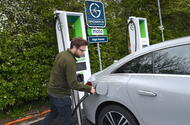Matchmaking EV Service Could Halve Fleet Public Charging Costs

The Association of Fleet Professionals (AFP) has launched a new “matchmaking” service that allows electric company cars to utilize the spare charging capacity of other operators. This innovative solution aims to fill gaps in public charging networks while providing an additional source of income for owners.
Challenges in Electric Vehicle Charging for Fleets
Electric vehicle registrations in the UK are primarily driven by fleets; however, charging infrastructure remains a challenge for businesses. Expensive public networks can deter fleets from electrification, and difficulties in installing depot and home charge points have hindered the deployment of electric vans for 65% and 49% of AFP members, respectively.
Despite these challenges, the AFP has found that many members are willing to cooperate. Six in 10 van fleets are prepared to make their chargers available to other operators, indicating a potential for collaboration.
The Matchmaking Service
The matchmaking service will initially launch as an online database, connecting operators with available chargers on an informal basis. Commercial arrangements will be ad hoc, but the AFP will provide guidance if needed.
In the future, a dedicated digital platform will be introduced, offering a more structured approach for fleets to register, search for, and book charging sessions. This platform will function similarly to Co-Charger, which allows homeowners to earn money by sharing their charge points with other drivers.
Affordable Charging Costs
The AFP committee has agreed on a maximum price of 40p per kWh of energy. This pricing ensures attractive margins for charge point owners while keeping costs down for end users. It is significantly lower than the average prices of DC rapid charging (80p per kWh) and slower AC units (56p per kWh), as reported by the Zapmap Price Index.
Development work on this matchmaking service will also address issues such as accessing private property, health and safety considerations, and establishing a fair method for measuring and paying for the energy used.
AFP chair Paul Hollick expressed optimism about the potential impact of the platform, stating, “If we can make the platform work, it should be quite a substantial boost for fleet EV charging. While it may not be a universal solution, as spare charging capacity may not be evenly distributed across the country, it will provide a valuable option for fleets beyond home charging, workplace charging, and pay-on-use public chargers.”

